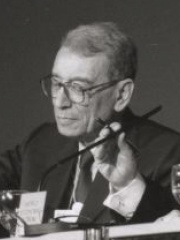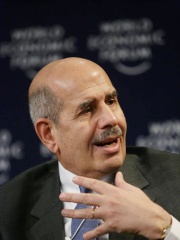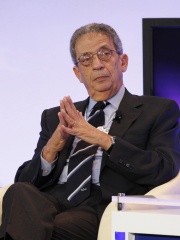


The Most Famous
DIPLOMATS from Egypt
Top 3
The following people are considered by Pantheon to be the most legendary Egyptian Diplomats of all time. This list of famous Egyptian Diplomats is sorted by HPI (Historical Popularity Index), a metric that aggregates information on a biography's online popularity.

1. Boutros Boutros-Ghali (1922 - 2016)
With an HPI of 76.72, Boutros Boutros-Ghali is the most famous Egyptian Diplomat. His biography has been translated into 86 different languages on wikipedia.
Boutros Boutros-Ghali (14 November 1922 – 16 February 2016) was an Egyptian politician and diplomat who served as the sixth secretary-general of the United Nations from 1992 to 1996. Prior to his appointment as secretary-general, Boutros-Ghali was the acting minister of foreign affairs of Egypt between 1977 and 1979. He oversaw the United Nations over a period coinciding with several world crises, including the breakup of Yugoslavia and the Rwandan genocide. Born to a Coptic Christian family in Cairo, Boutros-Ghali was an academic by training and taught international law and international relations at Cairo University from 1949 to 1979. His political career began during the presidency of Anwar Sadat, who appointed him acting foreign minister in 1977. In that capacity, he helped negotiate the Camp David Accords and the Egypt–Israel peace treaty between Sadat and Israeli prime minister Menachem Begin. He was acting foreign minister until early 1991, when he served as deputy foreign minister for a few months. Boutros-Ghali was elected secretary-general by the United Nations General Assembly in 1991 and began his term in 1992, succeeding Javier Pérez de Cuéllar. His tenure was marked by controversy and crises, which included the Somali Civil War, the Rwandan Civil War, the continuing Angolan Civil War and the Yugoslav Wars. He received criticism over UN inaction in Angola and during the genocide in Rwanda, and the perceived ineffectiveness of the UN peacekeeping operation in Bosnia led to a NATO intervention. In 1996, Boutros-Ghali ran unopposed for a second term as secretary-general, but the United States, long dissatisfied with his leadership, denied his bid by exercising its Security Council veto. After leaving the UN, Boutros-Ghali served as the first Secretary-General of La Francophonie from 1997 to 2002. He then became chairman of the South Centre, an intergovernmental think tank for developing countries. He died in 2016, in Cairo at the age of 93.

2. Mohamed ElBaradei (b. 1942)
With an HPI of 74.14, Mohamed ElBaradei is the 2nd most famous Egyptian Diplomat. His biography has been translated into 68 different languages.
Mohamed Mostafa ElBaradei (Arabic: محمد مصطفى البرادعي, romanized: Muḥammad Muṣṭafá al-Barādaʿī, Egyptian Arabic: [mæˈħæmːæd mosˈtˤɑfɑ (ʔe)lbæˈɾædʕi]; born 17 June 1942) is an Egyptian lawyer and diplomat who served as Director General of the International Atomic Energy Agency (IAEA) from 1997 to 2009, then as vice president of Egypt on an interim basis from 14 July to 14 August 2013. As Director General of the IAEA, he and the organization were jointly awarded the Nobel Peace Prize in 2005 "for their efforts to prevent nuclear energy from being used for military purposes and to ensure that nuclear energy for peaceful purposes is used in the safest possible way". At the end of his tenure, he was appointed "Director General Emeritus of the International Atomic Energy Agency". ElBaradei was featured in the Western press due to his views regarding Egyptian politics, particularly the 2011 revolution which ousted President Hosni Mubarak and the 2013 Egyptian coup d'état.

3. Amr Moussa (b. 1936)
With an HPI of 62.58, Amr Moussa is the 3rd most famous Egyptian Diplomat. His biography has been translated into 30 different languages.
Amr Muhammad Moussa (Arabic: عمرو محمد موسى, IPA: [ˈʕɑmɾe mæˈħæmmæd ˈmuːsæ]; born 3 October 1936) is an Egyptian politician and diplomat who was the Secretary-General of the Arab League, a 22-member forum representing Arab states, from 1 June 2001 to 1 July 2011. Previously he served in the government of Egypt as Minister of Foreign Affairs from 1991 to 2001. On 8 September 2013, he was elected president of the committee of 50 that will amend the Egyptian constitution.
People
Pantheon has 3 people classified as Egyptian diplomats born between 1922 and 1942. Of these 3, 2 (66.67%) of them are still alive today. The most famous living Egyptian diplomats include Mohamed ElBaradei, and Amr Moussa. The most famous deceased Egyptian diplomats include Boutros Boutros-Ghali.

